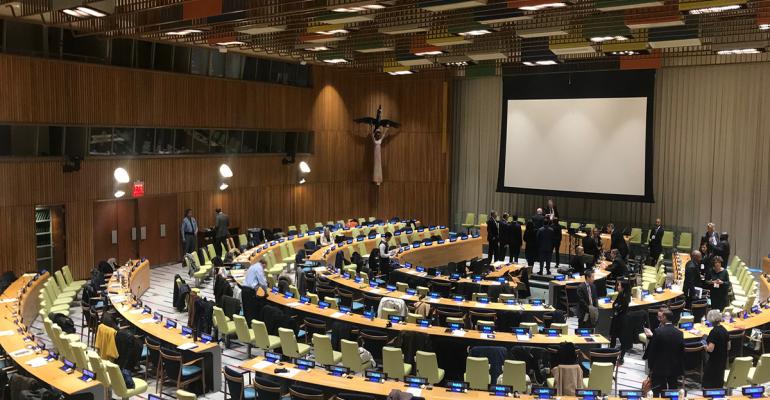While financial advisors may be a vital aspect of accelerating sustainable investing’s size in the wealth management space, one of the chief impediments they face is the lack of a common language or terminology on what it means to be sustainable, according to numerous speakers at the 2019 Sustainable Investing Conference held at the United Nations this week.
“Do we all have the same view of what a sustainable investment is? Do we all share the same view of the sustainable development agenda overall, and how do you measure the risk that is associated with sustainable investment?” U.N. Chief Economist Elliot Harris said during his keynote presentation. “Each of you has a different answer to that and that should be fine, but at some point, we are going to have to converge on our understanding of these issues if we want to really make that fundamental shift away from unsustainable activities.”
The conference was hosted by Gitterman Wealth Management on Tuesday and was held in the U.N.’s Trusteeship Council Chamber. It drew hundreds of attendees, including advisors, asset managers and other figures interested in institutional and retail sustainable investment opportunities. Throughout the day’s numerous panel discussions, speakers stressed how private capital could be wielded to help achieve the U.N.’s Sustainable Development Goals, which were approved by member states in 2015 under a timeline whereby they were to be achieved by 2030.
According to Andrew Lee, a managing director at UBS, it will take trillions of dollars per year to fulfill the goals within the next 10 years, and philanthropic assistance, he said, cannot do it alone. While Lee said the top 10 foundations aggregated to hundreds of billions of dollars, the world’s global private wealth was far, far higher.
“It’s clearly a significant amount of capital that’s needed, along with corporate change and investor behavior, if we’re going to change the trajectory the globe is on,” he said. “So, if we’re able to mobilize some portion of that that is invested sustainably, or invested conventionally with sustainable investments underlying, I think we can start to move the needle in terms of addressing the bigger challenges out there.”
In a discussion with Dazzle Rustam Bhujwala, the director of the investor network at Ceres, Lee outlined some of the barriers advisors and clients face in adopting sustainable investment strategies. He said that some were still hesitant to believe that environmental, social and corporate governance (ESG) investing could result in an equal or greater return than the conventional approach, and he echoed the call for uniformity in terminology, saying the convoluted jargon made it unnecessarily confusing for advisors who were novices in the space. Additionally, he stressed the need for advisors to educate themselves on sustainable investing’s benefits and aims.
“The bluntest way I could say it is if you’re not talking to your client about it, someone else is,” Lee said. “And that is a reason to start thinking about it and getting educated on it.”
Some research suggests that advisors who engaged in ESG or impact investing discussions with clients were actually growing faster than their peers, according to Brett Wayman, a vice president of impact investing at Envestnet. He also noted that coalescing around a unified terminology for impact and ESG investing would help advisors who were new to the space avoid “greenwashing,” which is when a fund or product is marketed as being environmentally friendly to attract investors when it is nothing of the sort.
“I think there’s the newer (advisors) who are still trying to figure out what’s going on. I think it would be a disservice to say they’re greenwashing. They’re just figuring it out,” he said. “I think there’s an opportunity for us to work together to try and do things like define standards … define terms and have a common language. As we do that, I think these advisors will become more comfortable.”





